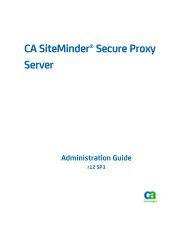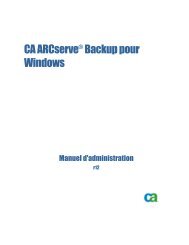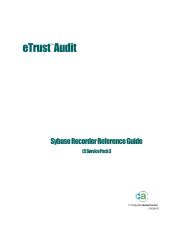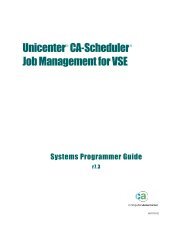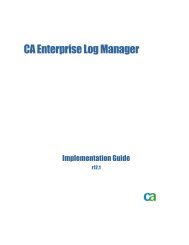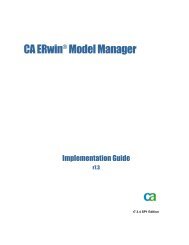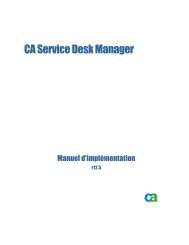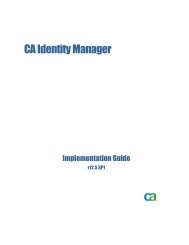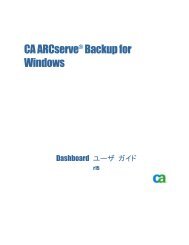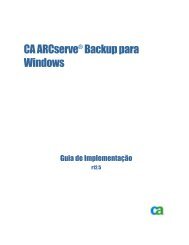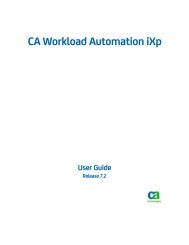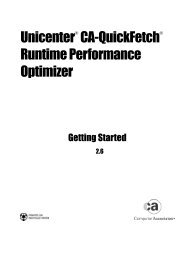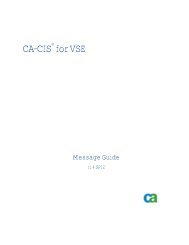Unicenter CA-Scheduler Job Management for VSE User Guide
Unicenter CA-Scheduler Job Management for VSE User Guide
Unicenter CA-Scheduler Job Management for VSE User Guide
You also want an ePaper? Increase the reach of your titles
YUMPU automatically turns print PDFs into web optimized ePapers that Google loves.
3.9 Defining <strong>Job</strong>s<br />
A value of YES on the schedule base record causes <strong>Unicenter</strong> <strong>CA</strong>-<strong>Scheduler</strong> to<br />
start that schedule no earlier than the time shown on the Simulated Execution<br />
Schedule. If USE SIM TIME = YES on the job base record, <strong>Unicenter</strong><br />
<strong>CA</strong>-<strong>Scheduler</strong> submits that job at the time indicated on the Simulated<br />
Execution Schedule. Notice the subtle difference here. The SIMTIME fields on<br />
schedule and job records do not override one another because they deal with<br />
separate events: when schedules start and when jobs are submitted. Sites that<br />
want to schedule jobs using SIMTIME get best results when SIMTIME values<br />
on both the schedule and job records are YES.<br />
If you set USE SIMTIME=YES on the schedule base record, <strong>Unicenter</strong><br />
<strong>CA</strong>-<strong>Scheduler</strong> ignores any other start times you may have specified <strong>for</strong><br />
schedules, either on the reason code record or the schedule's base record.<br />
If USE SIMTIME = NO, <strong>Unicenter</strong> <strong>CA</strong>-<strong>Scheduler</strong> checks to see what start times<br />
you have specified on the schedule's records. You specify the earliest possible<br />
time a schedule can start using a 24-hour clock. For example, an early time of<br />
1400 allows a schedule to start no earlier than 2 p.m., but what if that schedule<br />
should not start until some day in the future? <strong>Unicenter</strong> <strong>CA</strong>-<strong>Scheduler</strong> also<br />
allows you to specify start times with a prefix showing how many production<br />
days to hold those jobs. For example, a start time of 031400 holds that schedule<br />
until 2 p.m. three production days after that schedule was originally selected.<br />
Notice that production days usually do not start at midnight. Instead, they run<br />
from one autoscan to the next.<br />
The first place <strong>Unicenter</strong> <strong>CA</strong>-<strong>Scheduler</strong> looks <strong>for</strong> a start time is on the<br />
schedule's reason code record (SRC). If you do not specify a start time there<br />
that corresponds with the reason the schedule was selected today, <strong>Unicenter</strong><br />
<strong>CA</strong>-<strong>Scheduler</strong> looks to see if you defined an EARLIEST START TIME on the<br />
schedule base record. Start times defined on job records are not even looked<br />
at until a job's schedule starts. Then <strong>Unicenter</strong> <strong>CA</strong>-<strong>Scheduler</strong> checks to see if<br />
you have delayed any jobs by defining start times on job records.<br />
Since start time is an important factor in sequencing your workload, <strong>Unicenter</strong><br />
<strong>CA</strong>-<strong>Scheduler</strong> gives you flexibility. For example, a schedule or job may need<br />
to start at different times on different days. <strong>Unicenter</strong> <strong>CA</strong>-<strong>Scheduler</strong> allows<br />
you to define different reasons <strong>for</strong> selecting a schedule or job on its criteria<br />
record (SCR or JCR). Each reason can cause work to be selected on a different<br />
day. Once you have defined reasons on a criteria record, you can specify a<br />
different start time <strong>for</strong> each reason. A schedule's alternate start times are stored<br />
on its reason code record (SRC). Likewise, a job's alternate start times are<br />
stored on its reason code record (JRC).<br />
If a job has no criteria record or it only needs one start time, specify that value<br />
as EARLIEST START TIME on the job base record.<br />
When <strong>Unicenter</strong> <strong>CA</strong>-<strong>Scheduler</strong> organizes the work to be processed each day,<br />
first it considers predecessors. Then it checks start times. If schedules or jobs<br />
have the same predecessors and start times, <strong>Unicenter</strong> <strong>CA</strong>-<strong>Scheduler</strong> puts<br />
3-62 <strong>Unicenter</strong> <strong>CA</strong>-<strong>Scheduler</strong> <strong>User</strong> <strong>Guide</strong>



